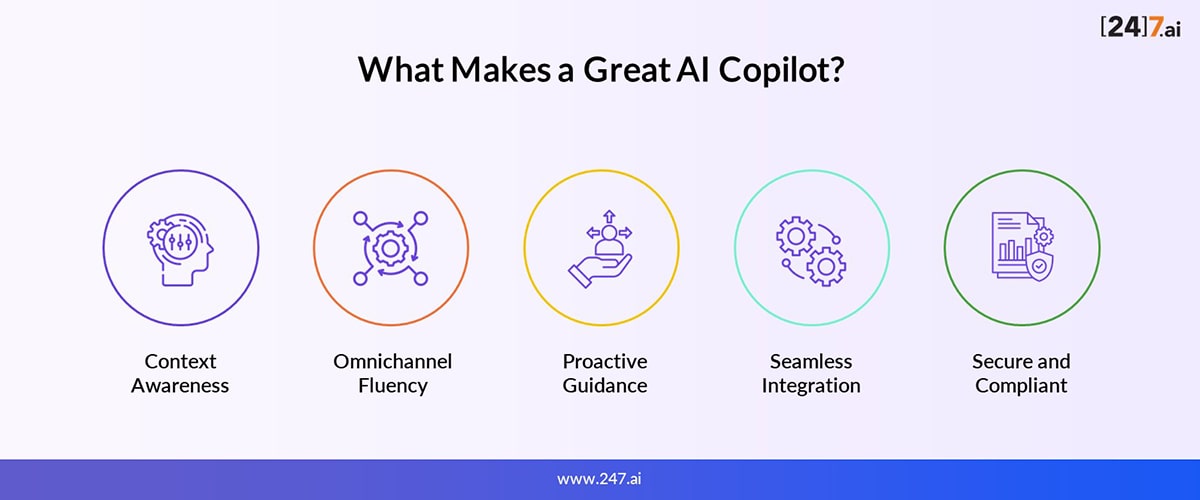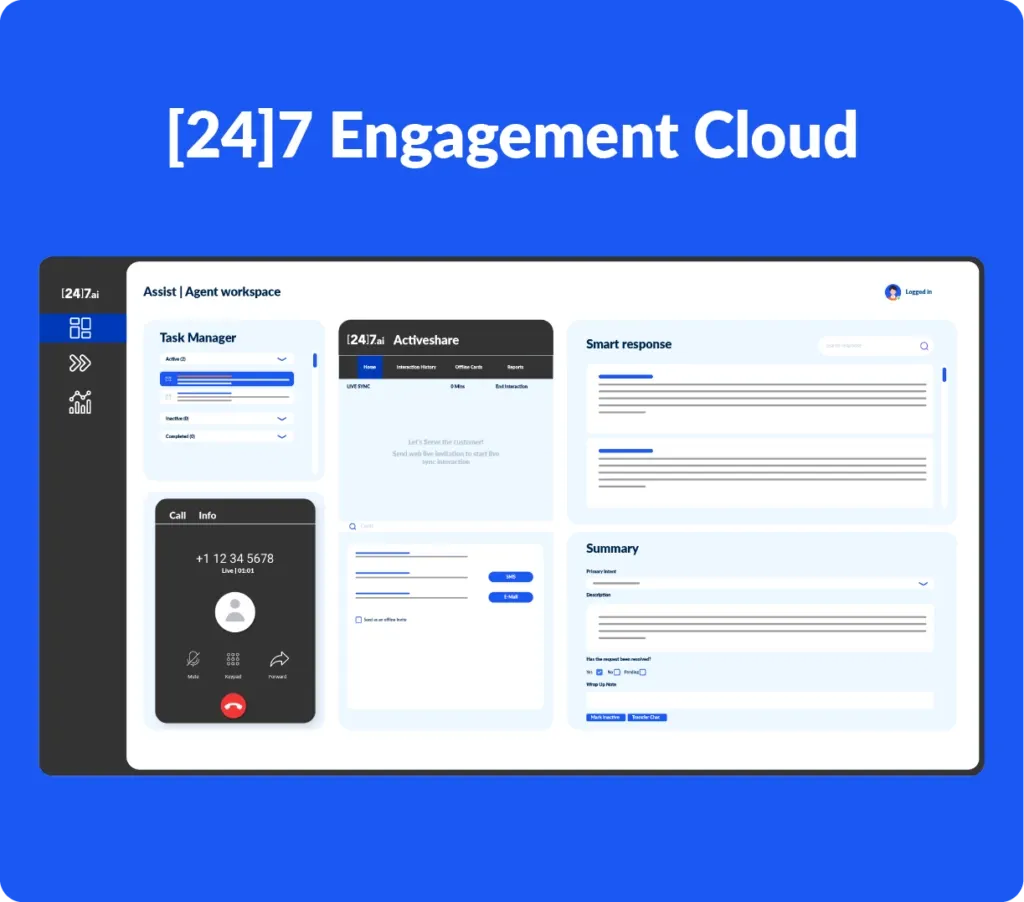Immediacy is the new standard in customer experience, and lagging behind is no longer an option for enterprises. With 60% of customers defining satisfaction by how fast they receive a resolution, speed and efficiency are now critical markers of business success.
To meet rising expectations, businesses are deploying AI copilots: smart, responsive assistants built to work alongside humans, enhancing productivity without replacing the human touch.
AI copilots are changing the way people work by assisting them in dealing with complex systems, making faster decisions, and personalizing consumer experiences on a vast scale. It’s no surprise that 75% of Fortune 500 companies have already deployed enterprise-grade copilot solutions, marking a pivotal step in the enterprise AI evolution.
From customer service workers handling high-stakes conversations to sales reps managing pipeline goals, AI copilots have proven critical in many different sectors.

What Is an AI Copilot?
An AI copilot is an artificial intelligence-driven assistant that works alongside human users to streamline tasks, suggest actions, and surface insights in real time. Unlike traditional automation tools that function behind the scenes, an AI copilot is proactive, context-aware, and conversational, thus providing timely support across critical touchpoints.
Think of it as a co-pilot in an aircraft: it doesn’t fly the plane alone but ensures safer, more efficient operation by guiding the human pilot with the right information at the right time.
How AI Copilots Work
AI copilots leverage several advanced technologies working in tandem:
- Natural Language Understanding (NLU): Interprets and analyzes natural language inputs, whether spoken or typed, to understand user intent, sentiment, and context.
- Predictive Modeling: Uses historical and real-time data to predict needs and suggest next-best actions.
- Conversational AI Engines: Manages dialogue flow and maintain contextual continuity across channels and interactions.
- Knowledge Retrieval: Connects to internal databases, knowledge bases, and CRM systems to surface relevant information.
- Machine Learning (ML): Continuously learns from user feedback and interaction patterns to improve accuracy, speed, and contextual relevance over time.
This multi-layered approach ensures that AI copilots can deliver highly relevant assistance instantly and intelligently.

Where AI Copilots Add Value
AI copilots are redefining workflows and elevating outcomes across departments and industries. Key areas of impact include:
1. Customer Support
Agents benefit from real-time suggestions, automated knowledge lookup, and response generation. AI copilots can monitor live conversations and assist by suggesting empathetic phrasing, surfacing customer history, or even flagging compliance risks.
2. Sales and Account Management
AI copilots can help reps identify qualified leads, automate follow-ups, and recommend the best time to reach out. They also assist in creating context-rich, personalized pitches based on a prospect’s behavior and history.
3. IT and Internal Helpdesk Support
For IT teams or HR service desks, copilots accelerate internal ticket handling by classifying queries, recommending scripts, or automating password resets and onboarding steps.
4. Field Operations and Logistics
Mobile-ready AI copilots can assist field workers with troubleshooting guides, compliance checks, and inventory tracking in real time, often through voice commands.

What Makes a Great AI Copilot?
Not all copilots are built the same. The most effective enterprise-ready copilots share the following capabilities:
- Context Awareness: They understand and retain the context of multi-turn conversations, recognizing customer history, preferences, and prior interactions.
- Omnichannel Fluency: A strong AI copilot can operate across voice, chat, email, and messaging apps, enabling consistency in customer experience.
- Proactive Guidance: Rather than waiting to be asked, copilots suggest relevant actions, highlight anomalies, or preemptively resolve common issues.
- Seamless Integration: Effective copilots connect to CRMs, ERPs, ticketing systems, and knowledge bases, thus aggregating data into one accessible interface.
- Secure and Compliant: In highly regulated sectors such as finance or healthcare, AI copilots must enforce strict data governance, privacy controls, and audit trails.

Why Enterprises Are Adopting AI Copilots Now
The case for AI copilots is clear:
- Efficiency: They reduce time spent on manual tasks, lower handling times, and speed up resolution.
- Accuracy: By eliminating guesswork and surfacing vetted knowledge, they enhance decision-making quality.
- Scalability: Copilots can handle spikes in demand without requiring proportional headcount increases.
- Employee Satisfaction: Empowering teams with smart tools boosts productivity, confidence, and morale.
Organizations that implement AI copilots typically report measurable improvements in customer satisfaction (CSAT), first contact resolution (FCR), and agent efficiency, often within just a few months of deployment.
How [24]7.ai Enables AI Copilot Experiences
By combining decades of contact center expertise with state-of-the-art AI, [24]7.ai empowers enterprises to deploy AI copilots that are intelligent, scalable, and human-centric. Our platform delivers:
- Real-time agent assistance for customer support scenarios
- Intent prediction and resolution orchestration through [24]7 Conversations
- Flawless integration with existing CRMs and knowledge platforms
- Ongoing optimization powered by AI-driven insights and feedback loops
Be it enhancing productivity in contact centers or guiding decision-making across digital journeys, [24]7.ai’s Agent Copilots are designed to help your teams do more, smarter and faster.
Closing Comments
AI copilots are not a futuristic idea, they’re here, and they’re reshaping enterprise workflows today. By embedding intelligence into every interaction, they’re empowering human teams, improving customer experiences, and driving measurable business outcomes.
If you’re ready to achieve the power of AI copilots in your enterprise, [24]7.ai is the partner to help you make it happen.
Frequently Asked Questions
Yes. AI copilots are increasingly used in back-office operations to assist with invoice processing, procurement approvals, and financial forecasting, freeing up employees from repetitive data-heavy tasks.
Advanced copilots are equipped with clarification strategies that prompt follow-up questions, use historical context, or pull additional data to resolve ambiguity without derailing the user experience.
Key challenges include poor data integration, lack of cross-functional alignment, insufficient training data, and change resistance from internal users who are unfamiliar with AI tools.
Not at all. While many Fortune 500 companies use them, midsize and scaling businesses can benefit just as much, especially when deploying copilots to optimize lean teams or high-growth operations.
After deployment, AI copilots continuously learn by analyzing interactions and feedback, adapting to new intents and workflows to stay effective and relevant.



